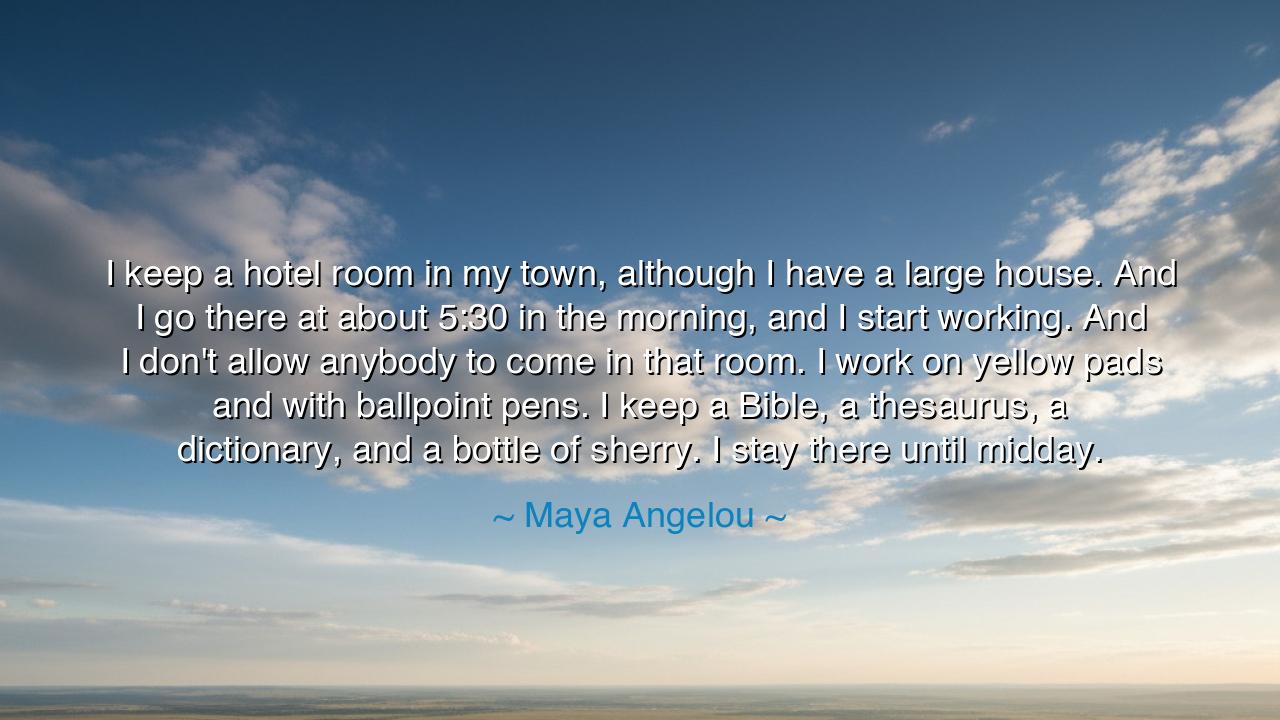
I keep a hotel room in my town, although I have a large house.
I keep a hotel room in my town, although I have a large house. And I go there at about 5:30 in the morning, and I start working. And I don't allow anybody to come in that room. I work on yellow pads and with ballpoint pens. I keep a Bible, a thesaurus, a dictionary, and a bottle of sherry. I stay there until midday.






The words of Maya Angelou, when she said, “I keep a hotel room in my town, although I have a large house. And I go there at about 5:30 in the morning, and I start working. And I don't allow anybody to come in that room. I work on yellow pads and with ballpoint pens. I keep a Bible, a thesaurus, a dictionary, and a bottle of sherry. I stay there until midday,” are not a mere description of habit, but a testimony of discipline, solitude, and the sacredness of creation. She unveils for us the hidden forge of the artist—the place where words are hammered into shape, where silence becomes the soil from which poetry blooms.
In this confession, Angelou teaches that the act of creation is not casual but holy. Though she possessed a large house, filled with comfort and luxury, she chose a hotel room—plain, stripped of distraction, a chamber consecrated to work. It was there, before the light of dawn, that she entered into battle with the blank page. And in that small room, with her yellow pads and ballpoint pens, she wrestled with truth, giving voice to a people, to pain, to joy, to the unyielding spirit of humanity.
Note the sacred instruments she carried: a Bible, a thesaurus, a dictionary, and a bottle of sherry. These were not ornaments, but companions in her labor. The Bible, a wellspring of eternal wisdom, connected her to the divine. The thesaurus and dictionary, tools of precision, allowed her to carve thought with clarity and strength. The bottle of sherry, a small indulgence, reminded her of the humanness of the struggle, that even in toil there may be comfort. With these by her side, she stood armed like a warrior-scholar, prepared to wrestle with words until the noon sun.
History too gives us echoes of this truth. Did not Leonardo da Vinci withdraw from courts and cities to fill his notebooks with sketches and musings? Did not Emily Dickinson, cloistered in her room, pen verses that would only later burst forth as immortal blossoms? Each of them, like Angelou, understood that greatness is birthed not in crowds or noise, but in the stillness where the soul may listen to itself. Thus, the hotel room is not merely a place; it is a symbol of the inner sanctuary each creator must find.
Angelou’s devotion to her practice reminds us that inspiration alone is not enough. The ancients said, “Discipline is the chisel by which the marble of genius is shaped.” Angelou rose at 5:30 in the morning, not waiting for the whim of inspiration, but summoning it through ritual and persistence. She did not wait for the muse to arrive; she prepared the ground, and in that preparation, the muse found her ready. This is why her words ring eternal—because they were forged daily, with patience and fire.
From her example, we learn that to achieve greatness, one must create sacred boundaries. To close the door, to guard the silence, to give oneself wholly to the task. In our age of endless distraction, her practice is a beacon: choose a space, consecrate it to your work, and enter it with reverence. Bring with you not only the tools of your trade, but the sources of your strength, whether sacred texts, books of wisdom, or small comforts that sustain the spirit.
Thus, the lesson is clear: discipline and solitude are the guardians of creation. To create is to carve out space and time from the clamor of the world, to retreat not in weakness but in strength. The practical path is this: rise early, guard your hours, and enter daily into your chosen sanctuary. Keep by your side the tools of knowledge, the companions of wisdom, and a reminder of your own humanity. In this way, like Angelou, you will wrestle with words—or with whatever craft is yours—until your work becomes not only labor, but offering.
So let us honor her teaching: that the room apart, the morning hours, the tools of wisdom, and the steady hand are the path by which fleeting thoughts are transformed into eternal works. And let us, too, find our own “hotel room”—whether a corner of a house, a quiet desk, or a sacred hour—where we may meet ourselves, and through discipline and devotion, bring forth the truths that the world most needs.






AAdministratorAdministrator
Welcome, honored guests. Please leave a comment, we will respond soon